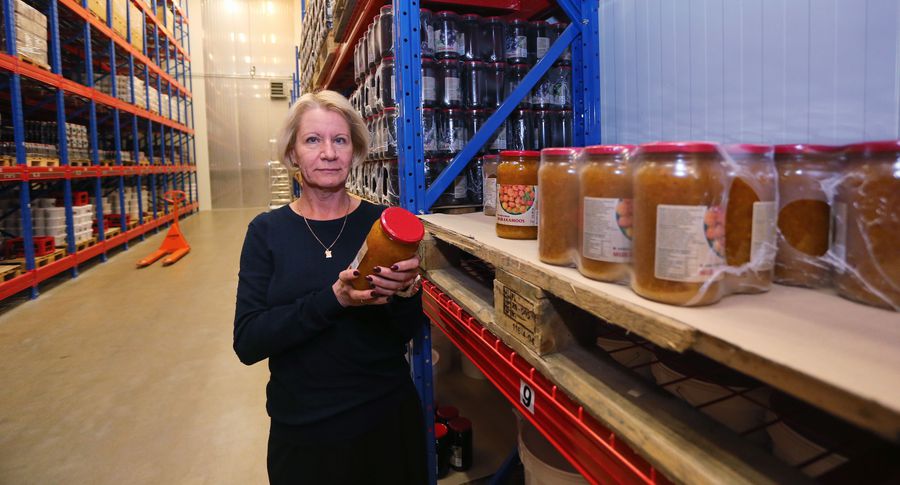Juice producers want to take on foreign markets with their organic products
 “This was a very big surprise, we didn’t expect it at all,” said Peeter Munitsõn, the owner of AS Rõngu Mahl, when commenting on the second prize awarded to the company’s organic lingonberry nectar at the Nordic Organic Food Fair held in Malmö, Sweden, which is also the largest organic food fair in the Nordic countries. The personnel of the juice factory were particularly pleased because this juice from Tartu County was awarded second place by the visitors of the fair who tried hundreds of products. The first prize went to a birch juice from Belarus.
“This was a very big surprise, we didn’t expect it at all,” said Peeter Munitsõn, the owner of AS Rõngu Mahl, when commenting on the second prize awarded to the company’s organic lingonberry nectar at the Nordic Organic Food Fair held in Malmö, Sweden, which is also the largest organic food fair in the Nordic countries. The personnel of the juice factory were particularly pleased because this juice from Tartu County was awarded second place by the visitors of the fair who tried hundreds of products. The first prize went to a birch juice from Belarus.
Pure ingredients only
This excellent result was no accident. Since 2010, when the juice production company reconstructed their entire production line with financial assistance from the Estonian Agricultural Registers and Information Board, the entire team has been working hard on improving the products. All flavours have been created by the company’s own workers and the innovations are led by the production manager Heli Käsper, said the company’s CEO, Anu Annus.
It may come as a surprise to many that Rõngu Mahl has as many as 124 different products. Some of the products are sold in stores; others are sold to companies supplying catering enterprises. With the lingonberry nectar, just as with other products from the organic range, the company seeks to win the hearts of people who prefer healthy food. “What distinguishes us is that we use real forest berries,” said Annus. The berries are picked from Estonian forests, but also from certified organic regions in Scandinavia.
Similarly to other Estonian organic producers, Rõngu Mahl has experienced difficulties with trying to get their products to the shelves of local organic stores.
Therefore, the company wants to break through to the Scandinavian and German market and hopes to double their approximately 2 million euro turnover in the next few years. If export turns out to be successful, the company plans to increase production efficiency.
In Munitsõn’s view, using berries for production always comes with risks. “This year, there were few berries, and so, blueberries were twice as expensive as before,” he explained.
However, the company’s executives and employees believe in what they are doing. “We are satisfied with our products and proud of the fact that what is on the label is also actually inside the products,” said Munitsõn.
With the lingonberry nectar, just as with other products in the organic range, the company seeks to win the hearts of people who prefer healthy food.
Annus says that the most difficult dilemma for the company to solve is that while the buyer wants a preservative-free product, they also want it to stay fresh for a long time. For large 3-litre juices, Rõngu Mahl has found an air-tight container, so the juice can be consumed for several months after opening. Products in glass containers just have to be eaten or drank faster, she explained.
It is often asked why a juice producer only makes nectar, but not pure juice. “It is simply not possible to drink 100% cranberry or lingonberry juice, it’s too strong,” explained Annus. Pure juices are, for example, apple, tomato, orange, carrot, or grape juice. With more strongly flavoured berries, one has to balance them out with dilution, she said.
Consumers need to be educated
It has also been difficult for the company to make the consumers understand that juice syrup and juice concentrate are very different things. “Often, the syrups sold in stores have little to do with juices. It’s basically flavoured and coloured sugar water,” said Munitsõn.
Concentrate, however, is made under pressure at a temperature of 50 degrees, thus preserving all the minerals and vitamins, explained Annus. Ten kilograms of berries translates to one kilogram of concentrate. “If you put the water back, you get a juice,” she added.
In restaurants, where meat is marinated on the spot or where desserts are made, the sale of concentrates is increasing, but in stores, customers still tend to go with the cheapest products, said the CEO.
The recent reluctance to consume added sugar has also required clever solutions. Thus, the company replaced the sugar in their blueberry jam with sweet apple.
The article was referenced from the Postimees.ee web page, link HERE.
